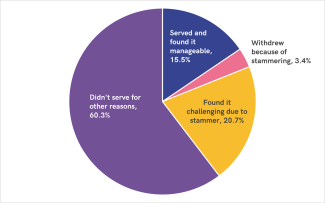
How to navigate jury service, or jury duty, if you have been summoned and you stammer. Find out what to expect and what support is available.
Disclaimer: This information is about jury service in the UK specifically. Some aspects might be the same or similar to other countries, but if you are not UK-based, check what the situation is where you live.
Being summoned for jury service can be a daunting prospect for anyone. But for people who stammer, the speaking situations involved can raise additional concerns. This page aims to address these challenges and help inform you about what to expect. It will also explain how you can navigate the process and get support if you need it.
What is jury service?
Jury service is when you are chosen to be part of a group of people, the jury, who decide the verdict of a criminal court case. Jurors listen to evidence, discuss it with fellow jurors, and decide if someone is guilty or not guilty. It's an important responsibility that helps make sure trials are fair.
Members of the public are chosen, or summoned, at random to attend. Things are slightly different in Scotland, where people are invited to attend court by letter, or 'citation', and then entered into a ballot to select jury members.
If you are called for jury service, you'll receive a letter telling you when the trial takes place and where to go. You will need to follow the instructions provided.
Do I have to do it?
You are eligible for jury service if you:
- are aged 18 to 75, if you live in England and Wales. In Scotland you just need to be 18 or over and in Northern Ireland it's 18 to 70.
- have lived in the United Kingdom, Channel Islands or the Isle of Man for any period of at least five years since you were 13 years old.
People with certain criminal convictions or severe mental health conditions do not qualify. You can ask to be excused or deferred if you have serious health issues. Or if you have caring responsibilities or unavoidable commitments.
Generally speaking, though, if you are summoned and you meet the eligibility criteria, you have to serve. However, you can request to be excused if you feel very uncomfortable about stammering as a juror. More on that later…
What does it involve?
When attending jury service there will be a few situations where speaking is required. These include a daily roll call and taking an oath or affirmation when being sworn in. But the majority of your time will be spent listening to the proceedings and the evidence. Your job will be to take all this in and consider it.
When the evidence has been given, the case and evidence will then be deliberated. This means discussing it with your fellow jurors to reach a verdict of guilty or not guilty. This is where everyone shares their views on the evidence and expresses their opinions. The aim is to work towards a unanimous or majority verdict. You can contribute as much or as little as you like, but it is important that you have your say.
To give you more of an idea of what jury service involves, watch this video from the Ministry of Justice, which provides an overview of the process. (It's aimed at viewers in England and Wales, so the details about eligibility age is different if you live in Scotland or Northern Ireland. And bear in mind that Scotland also has a 'not proven' verdict in criminal cases too.) While we don't love the video, it does offer a general understanding of what you can expect when called to serve.
We asked the community…
In 2024, we ran a quick poll on our Facebook page and Instagram to understand how people who stammer feel about jury service. Here's what we found from the responses from a total of 58 people who had been summoned in the past. Experiences vary hugely:
Fig: What was jury service like for STAMMA supporters?

With regards to the 60.3% that didn't end up serving, there are usually more jurors summoned than needed, so you might not even get picked on the day.
Concerns people who stammer might face
A few people who stammer have contacted our helpline and webchat services, telling us about their concerns about jury service. They spoke about:
- Speaking in front of a group. The idea of having to speak in front of other jurors, judge and solicitors can be intimidating. Especially saying the oath in front of everyone in the courtroom. In Scottish courts, the oath or affirmation will be put to you in the form of a question to which jurors give a collective answer 'I will'. This means you don't have to read it out in front of the whole Court.
- Being 'in your own head'. Someone felt they would not be a good juror because they'd be constantly thinking about stammering. They were concerned that they wouldn't be able to do the role justice.
- Judgement or misunderstanding. Some people worry that their stammer might lead to misunderstandings. Or that others will see them as a hindrance to fulfilling their duties, or won't take them seriously.
What can you do if you're called for jury service?
If you are summoned for jury service and are concerned about how your stammer might impact your ability to serve, here's what you can do:
- Ask for support. You are entitled to accommodations to support you, called 'reasonable adjustments'. For instance, you can ask for extra time to speak. Consider telling the court that you stammer and would like support, so that they can put accommodations in place. You can do that either when you are first summoned, or at a later stage. If you feel that would help see gov.uk's information on requesting reasonable adjustments, if you live in England or Wales. If you live in Scotland see the Scottish Courts & Tribunals Service website for details on getting reasonable adjustments. And if you live in Northern Ireland contact the Northern Ireland Courts & Tribunal Service.
- Contact us for support: If you are feeling nervous about jury service, why not phone our helpline or start a webchat? Our volunteers can give you support and a chance to practise anything you'd like to, or need to, say. There might be a local stammering group where you can get support and practise too. See our list of Communities & Groups.
- Request a deferral or exemption. If you strongly feel that stammering would make it difficult to fulfil your duties, you can request a deferral or exemption. You'll need to explain your reasons. In our experience, the request is usually agreed to.
Telling the court that you stammer could help to make you feel less anxious about being 'found out'. If they know that you stammer, it can help them to recognise it and understand how it might affect you.
If at any stage you feel that you are being treated unfairly or that your stammer is being misunderstood, you can raise your concerns with the court. The Scottish Courts & Tribunal Service employs a Jury Liaison Officer to deal with any concerns that a jury member may have. You can always ask to speak to that person if there is anything which is worrying you about serving on a jury as a person who stammers.
Other things that might help
Speak to the foreperson
If you feel comfortable doing so, it might be an idea to talk to the foreperson about your stammer. The foreperson is the member of the jury who is appointed to lead the deliberations. You could tell them how stammering affects you and how they and others on the jury can support you. For instance, if it would be helpful if they gave you time to speak and didn't finish your sentences or speak over you. Perhaps show them one of our 'I Stammer' cards, or give them a link to our information pages. They can then talk to the others on the jury.
Focus on the case
It might be easier said than done, but try and focus on the facts of the case rather than worrying about stammering. Thinking about taking it all in could distract you from negative thoughts. If you're a fan of true crime podcasts and documentaries, this is your chance to put your interests to work!
Final words
Jury service is an important responsibility. While it's natural to have concerns, it's important to remember that support is available.
If you are thinking of requesting an exemption, why not talk things through with us first? Putting yourself in uncomfortable situations might give you confidence. It might show you that you can do things you didn't think you could. But it can be hard, so don't beat yourself up if it feels too much. And don't forget that jury service is a lot about listening rather than speaking.
If you've been called for jury service and have concerns about stammering, don't hesitate to reach out to STAMMA for support. We're here to help you through the process and ensure that everyone has the space to stammer.
What next?
- Become A STAMMA Member for free and join the community. We'll keep you updated with our activities and campaigns.
- Share your experiences. Have you ever been summoned for jury service? Fancy writing an article to tell others how it went (minus the case details of course)?
- Get involved with the STAMMA community. Find an event, fundraise, volunteer, take part in research and more.
Donate & make a difference
Creating this page was only possible thanks to your kind donations.
Please consider making a donation to STAMMA: click here. You'll be helping us to:
- keep our support services running for people who stammer and worried parents
- put on workshops and support groups
- stage events to bring people together
- create guides for teachers and employers
- create our award-winning campaigns for change.
Thank you.
Our information
Find out How We Produce Our Information.
What did you think of this page? Give us your feedback, we'd love to hear from you.

































